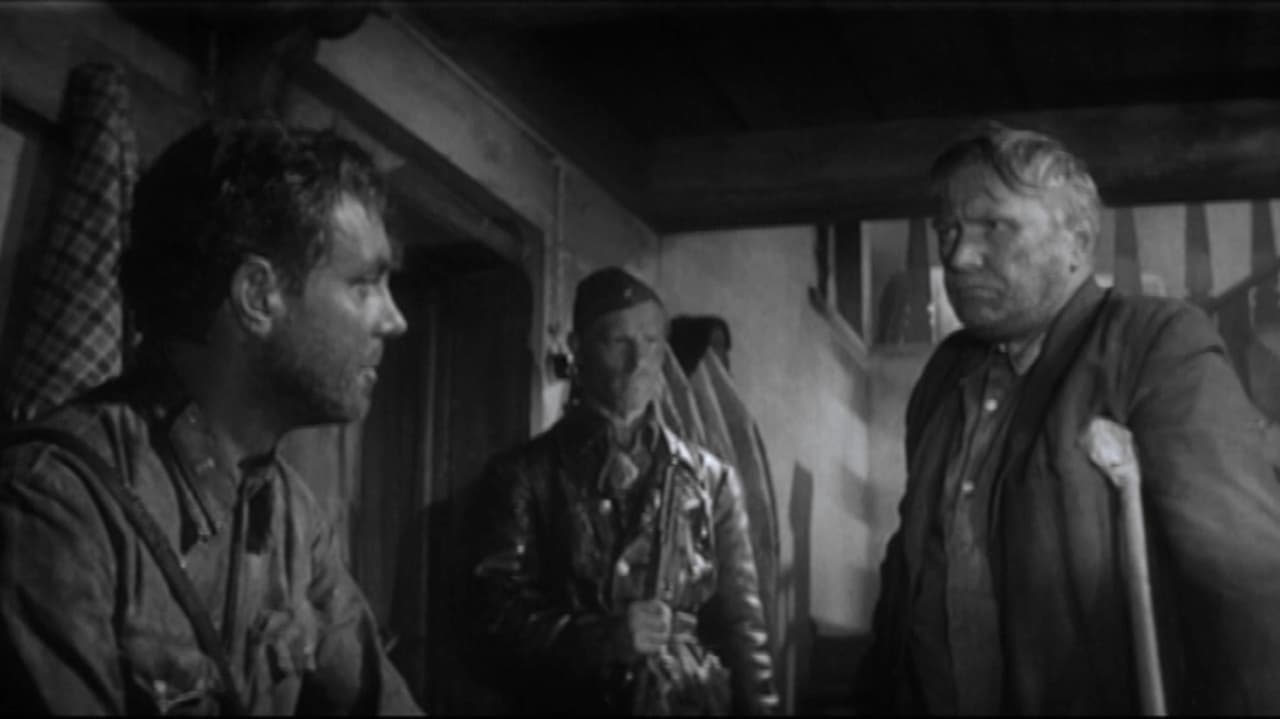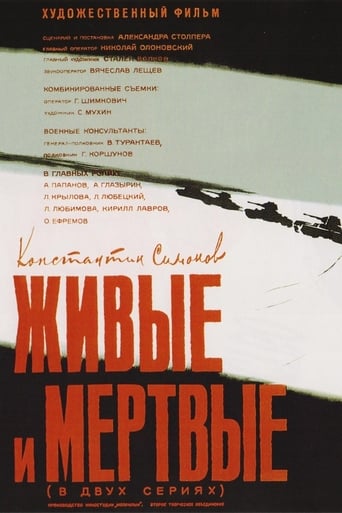



Very disappointed :(
After playing with our expectations, this turns out to be a very different sort of film.
View MoreI didn’t really have many expectations going into the movie (good or bad), but I actually really enjoyed it. I really liked the characters and the banter between them.
View MoreThis movie feels like it was made purely to piss off people who want good shows
View More51 years after the release of "THE ALIVE AND THE DEAD", I've finally watched that incredible masterpiece. The movie is as relevant now as it was back in 1964. The movie tells the story of a man, a good man, in the long, infinite, brutal, heroic year of 1941 - the first year of the darkest period in history. The director did an amazing job - the movie is visually astonishing, many of the frames could be, as they are, framed and pinned to a wall. The actors are some of USSR's best - each one does his role in the best possible way, truly amazing. Most of the actors playing soldiers in this movie are actual World War II veterans. In some scenes, the eyes tell more than words could ever tell. The dialogues are breathtaking and truthful. The movie presents the true horror of this war and the UNBEARABLE weight on the shoulders of the Red Army soldiers. They fought in rain, in snow, in mud, they went through ice and fire. They kept on fighting while being burned alive in tanks, airplanes, ships and trenches. They heroically fought for every hill, for every village, for every station, for every city - for every piece of their land occupied by the most ruthless enemy in human history. They fought the Germans while knowing that their wives and families are at great danger - maybe already tortured and dead or maybe also fighting on the fronts of this forsaken war. The movie perfectly represents that the chances to survive were so incredibly small that each man understood that every day, every minute could be the last. Still - they had hope, still they kept on fighting, still THEY WON THIS WAR. But in this masterpiece, the victory is still very far - this is only 1941.. the war had just begun. With no doubt - 10/10
View MoreWhen I was a kid, in a communist country, in the bloody '80s, the innumerable soviet war movies, Manicheistic and propagandistic, had already been chased out of the movie theaters (and out of the TV programs as well); so I was 23 when I have seen my first soviet movie with a WW 2 subject (a Ciuhrai, or Tchukhray movie, 'The 41st', which I very much enjoyed). The soviet WW 2 movies have their admirers—and not for ideological reasons. Was there anything else in them —besides propaganda and obviousness? They resemble each other, stylistically—a high—voltage style, low budgets, overacting, very straight narratives, standard lines, poor scripts, exalted patriotism. Qualitatively, some were very good, others—less so, others—average, still others—bad, and perhaps many—unbearably silly and distasteful. They're not history, but mythology. In the '50s, they flooded other communist countries. Those who have seen many such flicks admit that, though the subjects were silly, the movies were relatively well made, and on a low—budget; and others resent them, seeing in them only propaganda tools.Common people generally don't read much; but they see movies. So this is the way to indoctrinate them. In the 20th century, under leftist dictatorships (Russia—mainly from Lenin to Brejnev, Vietnam, North Correa, China), the cinemas have been used, due to their too obvious popular appeal, as huge propaganda machines, sharp tools of brainwashing, for fomenting various forms of national communism and patriotic awareness and for filling the minds with clichés and propagandistic silliness and atrocious slogans; in a different way, the same is true for the Hollywoodian cinema (and speaking only about an openly politic leftist trend, from Trumbo to Sean Penn, countless propagandists work in the area; Teachout dislikes these guys, Ebert hails them, I am a reader and admirer of both Teachout and Ebert, and I find Teachout better than Ebert). On the other hand, under milder circumstances, in moderate socialist regimes, awesome national cinema schools flourished (Poland, the Czechs, Hungary, even Yugoslavia to some degree; of course, Russian and the other soviet republics after the '50s).As I never cease repeating, I am a die-hard aficionado of the soviet cinema.
View MoreStolper did not take from the book to the screen a lot of Stalin-praising garbage and concentrated on the battle scenes and interactions between soldiers. Let's not forget that this was the movie that brought Papanov to national fame.One thing that is disappointing is high degree politicizing, which was unavoidable in a 1963 Soviet movie. The second half of the book and the movie deals with how Sinzov lost his party id card and is fighting to get back the credibility and rank. Other then that the movie works.
View More